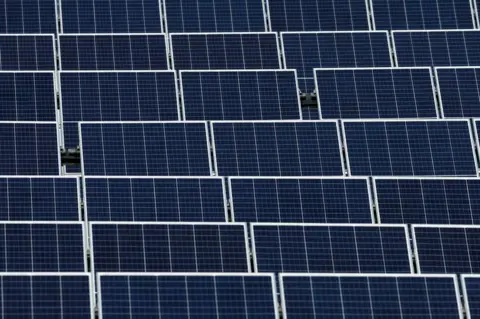The recently announced plans regarding Britain’s state-owned energy company, GB Energy, have sparked significant discussion due to their implications for human rights and renewable energy sourcing. A change in regulations will now prohibit GB Energy from utilizing solar panels linked to slavery or human trafficking, particularly those sourced from China. This decision arises under an amendment proposed by Energy Secretary Ed Miliband to bolster legislative measures aimed at ensuring the supply chains of GB Energy are devoid of exploitative labor practices.
The urgency of this amendment was underscored after lawmakers rejected a prior amendment to a bill that sought to prevent GB Energy from deploying funds on solar panels associated with credible evidence of modern slavery. The controversial production of solar panels in China’s Xinjiang region has been implicated in the systemic exploitation of Uyghur Muslims. The stark social and ethical ramifications of these practices have not only raised alarms within the UK government but have also drawn the attention of the international community.
China’s monopoly in the renewable energy sector is evident, as it accounts for around 50% of the world’s polysilicon production—an essential component in manufacturing solar panels. The UK, which imports over 40% of its solar photovoltaic (PV) systems from China, faces a challenging conundrum. The combination of energy security and ethical considerations creates a tightrope for the British administration, and the recent political veracity surrounding this issue reflects its complexity.
This recent legislative shift comes on the heels of a significant abstention by numerous Labour MPs during a vote on the aforementioned amendment proposed by Lord Alton in the House of Lords. Subsequent discussions within government corridors indicated an emerging consensus that GB Energy ought to navigate the renewable landscape as a conscientious industry leader. This strategic pivot has garnered widespread praise, including from Fatih Birol, the head of the International Energy Agency, who applauded the UK government’s decision to take a principled stance.
Nonetheless, the reactions among political factions remain mixed. Labour MPs recognize this move as a significant victory for advocating ethical standards in renewable energy sourcing. Conversely, critics, including Acting Conservative shadow energy secretary Andrew Bowie, have labeled the amendment a “humiliating U-turn” for Miliband. Similarly, prominent figures like Sir Iain Duncan Smith have voiced that failing to enforce such changes could have invoked more severe dissent among government ranks, suggesting a strong public support for action against products associated with slave labor.
Despite the proactive measures being enacted, the implementation of such amendments presents inherent challenges. Not only is GB Energy aiming to eliminate exploitative practices within its supply chains, but achieving this goal will require substantial legislative rigor and ongoing scrutiny. Past investigations, including accounts from the BBC, have highlighted the prevalence of forced labor within various sectors supplying both cotton and solar technology to the UK.
Moreover, reports indicate that in 2023, some UK military operations utilized solar panels fabricated by companies with high exposure to forced labor practices in China. Luke de Pulford, an advocate from the Inter-Parliamentary Alliance on China, pointed to widespread issues of state-imposed forced labor in the renewables sector, signifying the depth of the crisis that extends far beyond solar panel production alone.
The UK government is now faced with the prospect of reconsidering its reliance on solar panels sourced from the Xinjiang region. While officials assert that this legislative change will not hinder the nation’s ambitions for achieving net-zero emissions, a transition towards alternative sources of solar technology will require methodical planning and diversification efforts. A spokesperson from the Department for Energy Security and Net Zero emphasized that no industry in the UK should depend on forced labor and outlined the government’s commitment to developing resilient and ethical supply chains for sustainable energy solutions.
As GB Energy lays down concrete objectives to ensure that slavery and human trafficking are abolished from its operations, the road ahead remains fraught with potential pitfalls, yet it heralds a critical evolving narrative in the intersection of environmental sustainability and human rights advocacy. The anticipation of a new amendment dedicated to these objectives underlines the importance of ethical deliberation in the face of technological advancement and market complexity within the renewable energy framework.



